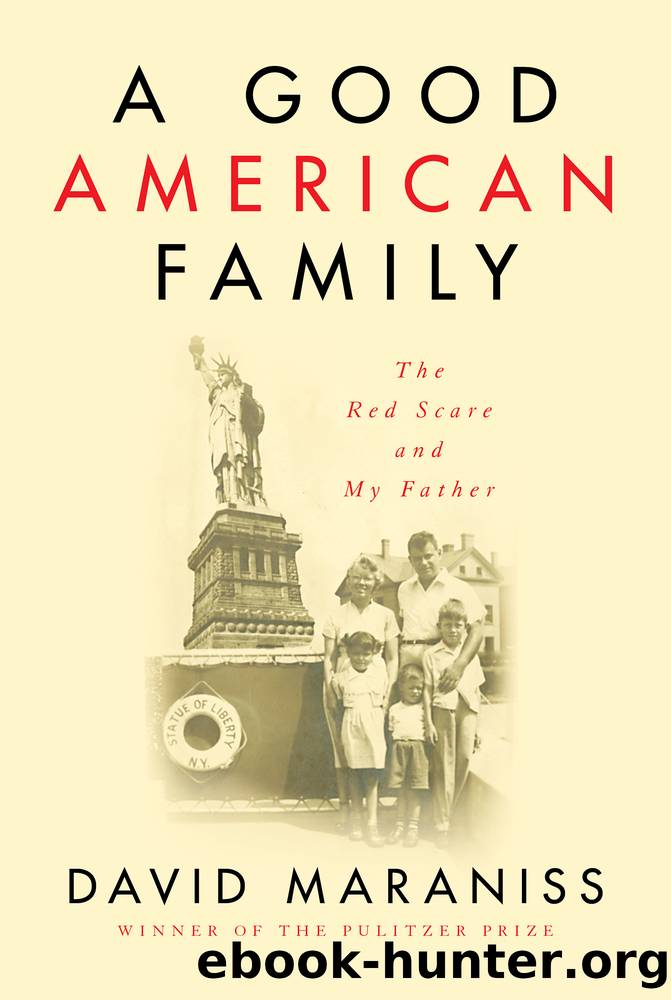A Good American Family_The Red Scare and My Father by David Maraniss

Author:David Maraniss [Maraniss, David]
Language: eng
Format: epub
Tags: history, biography, Politics
ISBN: 9781501178375
Google: 9S2BDwAAQBAJ
Amazon: B07MGS7SYW
Goodreads: 42201333
Publisher: Simon Schuster
Published: 2019-05-14T00:00:00+00:00
* * *
THE TAVENNER NAME was well known in Woodstock and its environs for influence and apples, which makes sense since the two were synonymous in the Shenandoah Valley. Another large apple operation out there, in the fields near Winchester thirty miles to the north, was run by the family of Harry Flood Byrd, whose political machine controlled state politics for much of the twentieth century. Byrd got his political start by succeeding Tavenner Sr. in the Virginia Senate from the Tenth District, then rose to become governor for four years and a U.S. senator for thirty more. He also owned the major newspaper in the Shenandoah, the Winchester Star. He and Tavenner Sr. were friendly competitors in the apple industry and allies in the political realm as conservative southern Democrats who adhered to the racial biases and traditions of the Old South while pursuing their own entrepreneurial agendas.
How appropriate that the apple would emerge in this search to understand the forces that intersected in Room 740 and the question of what it means to be American. The home territory of the future HUAC chief counsel was apple territory in a stateâand nationârich in apple history. The settlers at Jamestown brought the first apple seeds to North America in 1607, and by the end of that century there were orchards with as many as 2,500 apple trees in some parts of the commonwealth. By the time Woodstock was chartered in 1761, apples were emerging as a staple of the American diet, and for generations thereafter commercial orchards became ever more lucrative. âThe orchards of Virginia are today worth more than the gold mines of other sections,â the Shenandoah Herald proclaimed in 1905, the same year that a pomologist at the U.S. Department of Agriculture listed seventeen thousand different apple varieties, of different colors, shapes, and sizes.
The apple holds a special place in mythology, its evocations as contradictory as America itself. Emerson called the apple âthe American fruit,â even though it, like almost everything else American, came from somewhere else. The apple symbolized both the domestic and the wild, the innocent and the fallen, the vibrancy of the New World and the hackneyed clichés of shirtsleeve patriotism. As American as apple pie. Johnny Appleseed spreading apple trees through the heartland. An apple a day keeps the doctor away. The apple doesnât fall far from the tree. How do you like them apples? Henry David Thoreau, the national contrarian, disdained cultivated varieties and yearned for apples âsour enough to set a squirrelâs teeth on edge and make a jay scream.â Thereâs a rotten apple in every bunch. Which leads to the most famous apple of all, that forbidden fruit in the Garden of Eden. Did Eve, at the urging of Satan disguised as a snake, bite into an apple? Scholars say it more likely would have been a fig, but John Milton used the word âappleâ twice in Paradise Lost, and the apple appears in modern portrayals of the Bibleâs foundation story of human sin.
Download
This site does not store any files on its server. We only index and link to content provided by other sites. Please contact the content providers to delete copyright contents if any and email us, we'll remove relevant links or contents immediately.
| Anarchism | Communism & Socialism |
| Conservatism & Liberalism | Democracy |
| Fascism | Libertarianism |
| Nationalism | Radicalism |
| Utopian |
The Secret History by Donna Tartt(16657)
The Social Justice Warrior Handbook by Lisa De Pasquale(11493)
Thirteen Reasons Why by Jay Asher(7801)
This Is How You Lose Her by Junot Diaz(5798)
Weapons of Math Destruction by Cathy O'Neil(5046)
Zero to One by Peter Thiel(4834)
The Myth of the Strong Leader by Archie Brown(4795)
Promise Me, Dad by Joe Biden(4455)
Beartown by Fredrik Backman(4433)
Stone's Rules by Roger Stone(4422)
How Democracies Die by Steven Levitsky & Daniel Ziblatt(4413)
The Fire Next Time by James Baldwin(4350)
100 Deadly Skills by Clint Emerson(4085)
A Higher Loyalty: Truth, Lies, and Leadership by James Comey(4039)
Rise and Kill First by Ronen Bergman(4020)
The David Icke Guide to the Global Conspiracy (and how to end it) by David Icke(3891)
The Farm by Tom Rob Smith(3878)
Secrecy World by Jake Bernstein(3788)
The Doomsday Machine by Daniel Ellsberg(3737)
